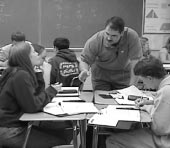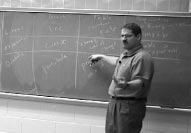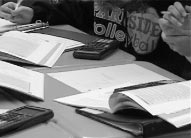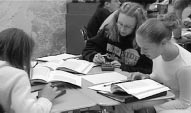Solving the Equation
Project 2061 Studies Factors That Improve Student Learning in Mathematics
 |
According to a recently released study of Title I schools conducted by the U.S. Department of Education, “students made greater gains in mathematics when teachers highly rated their professional development in mathematics and said that it matched their school’s reform plan, focused on standards and assessments, and added to their confidence in using new approaches.” This correlation between teachers’ ratings of their professional development and student learning underscores the positive effect of quality professional development on the classroom. But to know more about how teachers can best incorporate effective instructional practices, the influence of professional development needs to be studied through classroom observations and in connection with factors such as curriculum materials. Project 2061’s evaluation of middle-grades mathematics textbooks indicates that some materials have high potential for improving student learning, but empirical study is needed to show how these materials—and professional development related to these materials—can actually support effective teaching practices and improve student learning.
With a $5.8 million grant from the Interagency Education Research Initiative (IERI), Project 2061—in partnership with the University of Delaware and Texas A&M University—is contributing to this empirical work by studying how to provide, on a large scale, the professional development and continuing support teachers need to improve student learning of key ideas and skills in middle-grades mathematics. IERI, a unique joint initiative of the National Science Foundation (NSF), the Department of Education, and the National Institute of Child Health and Human Development, supports research aimed at improving the teaching and learning of reading, mathematics, and science from pre-kindergarten through grade 12.
Because the process of improving student learning is so complex and requires coordinated reform of many different parts of the educational system, no one factor is likely to improve student learning. Rather, it is the interactions among several factors that can lead to lasting improvements in student learning. To examine these interactions in the context of middle-grades mathematics, Project 2061’s IERI study focuses on three questions:
- What is the relationship between teacher knowledge, the use of research-based instructional strategies—supported by highly rated curriculum materials—and student learning of specific ideas and skills?
- How does professional development and ongoing support—focused on specific mathematics learning goals—build teacher knowledge and lead to more effective teaching practices?
- How can technology help to provide effective teacher professional development and ongoing support cost-effectively on a large scale?
The research based on these questions will shed light and provide much-needed evidence on how multiple educational factors work together.
   
|
Putting Theory into Practice
To collect valid data on what and how teachers and students are learning,
the study’s researchers will use several research methods. “This
study of curriculum materials and student learning will actually observe classroom
practice instead of using teacher self-reports as a measure of what teachers
are doing,” said Jo Ellen Roseman, acting director of Project 2061 and
principal investigator for the study. “In addition, instead of using
off-the-shelf tests to measure student learning, our study will use not only
the state tests that the students in Delaware and Texas are already taking
but also assessment items specially designed to align with the particular
benchmark ideas being used to gauge improved understanding.”
Both the classroom observations and student assessments build on other areas of Project 2061’s work. The analysis of classroom practice is guided by the same criteria and indicators used in the project’s evaluations of instructional support in middle-grades mathematics and high-school algebra textbooks. Whereas the textbook evaluations provided theoretical information about the likely effectiveness of the curriculum materials, this study will provide empirical evidence about how research-based curriculum materials and teacher practices yield improved learning. The study’s student assessment component draws on Project 2061’s NSF-funded analysis of assessment tasks for their alignment to standards. By designing student assessments to align with the mathematics benchmarks used in the IERI study, researchers will be able to gauge more accurately what students have—and have not—learned.
Databases and Discussions
In keeping with IERI’s emphasis on education reform strategies that
use information and computer technologies, Project 2061 is using technology
both to manage data collection and to enhance professional development and
ongoing support for teachers. A computer utility developed by Project 2061
allows researchers to analyze video-recorded classroom lessons in relation
to the lessons as they appear in highly rated textbooks. A detailed description
of the program of activities and resources recommended in each textbook—that
is, the literal program—provides a basis for monitoring, describing,
and analyzing teachers’ use of the material. Researchers can note, for
example, which tasks are actually implemented in the classroom, what modifications
are made, and what additional tasks are assigned. They can also make judgments
about whether the teachers’ lessons meet individual criteria for good
instruction like providing a sense of purpose and providing experiences with
relevant phenomena. Once classroom lessons are analyzed using the utility,
teachers’ patterns of use and modification of the curriculum materials
will be related to patterns of student achievement.
The study will also document the potential that technology has for supporting, sustaining, and scaling up effective teaching practices. Video clips of teachers implementing the “literal program” of textbooks with varying degrees of fidelity will be used in professional development so that teachers can judge how well the enacted lessons support learning of important ideas and skills. These lesson clips, along with student work samples resulting from the lessons and other teacher support materials, will be made available to teachers via the Internet. In addition, ongoing technology-based support in the form of telecommunications networks will make possible on-line discussions among teachers in widely separated schools or districts. These technology-assisted opportunities for teachers to analyze their own teaching, explain their ideas, and demonstrate their skills to one another constitute one way that the study’s professional development will model the same research-based principles of effective teaching that teachers are asked to include in their practice (see "Principles of Effective Teaching" below).
With the IERI mathematics study well into its first year, plans are underway to design comparable studies of the factors that improve student learning in science. For more information about Project 2061’s curriculum materials analyses, assessment analysis procedure, and professional development, visit www.project2061.org.
Principles of Effective Teaching
The professional development and ongoing support in Project 2061’s IERI study are based on and will model the same research-based principles of effective teaching that teachers are asked to include in their classroom practice. Specifically, the professional development will do the following:
Provide a sense of purpose.
Rather than presenting principles of effective teaching as abstractions, professional
development will be situated in relevant classroom teaching situations. The
purposes of professional development activities will be explicitly stated
and strategically sequenced.
Take account of initial ideas and skills.
Professional development will attend to prerequisite knowledge and skills,
taking time to find out where teacher participants are starting from and helping
them overcome both common misconceptions about mathematics learning and ineffective
habits of teaching.
Provide experiences with relevant phenomena.
For professional development, the “phenomena” identified from
case studies will be either instances of proficient teaching toward specific
learning goals or instances where proficient teaching correlates well with
improved student achievement of those goals.
Develop and use ideas and skills.
Professional development will use data collected to demonstrate to teachers
the merit of the ideas and skills they will learn; model the use of research-based
teaching practices; discuss essential aspects of the models and criteria by
which teachers can analyze their own teaching; and provide opportunities for
teachers to practice skills in their own classrooms and obtain feedback.
Promote thinking about experiences with phenomena, knowledge, and skills.
Teachers will have opportunities to explain their ideas and demonstrate their
skills to one another; practice their interpretation and reasoning about mathematics
ideas, learning, and teaching; and monitor their own progress.
Assess progress.
Teachers’ learning will be monitored by questionnaires and interviews,
observations of their classroom teaching practices, and analyses of their
students’ learning.
Enhance the learning environment.
Teachers will be shown how to improve their own understanding of mathematics
ideas, learning, and teaching.Sessions will create a classroom environment
that welcomes teacher curiosity, encourages a spirit of healthy questioning,
avoids dogmatism, encourages high expectations, and enables every participant
to experience success.
Related Articles:
New study is one for the books, from University of Delaware Messenger
Tramontana, C. 2002. Solving the Equation: Project 2061 Studies Factors That Improve Student Learning in Mathematics. 2061 Today, 12 (2).



